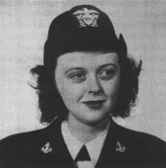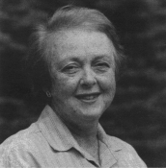




The last bell buzzes; it is time to prepare for my interview with Marcella Hance. I meet a handsome, freckled, woman at the front office and lead her to the high school library. As she shares her memories from the past, I learn the life of a unique, independent, woman; a social butterfly; a young beauty of her time.
I was in the Navy from February 1944 until I was discharged in September 1945. I was commissioned as an analyst and assigned to communications training where we learned to code and decode. I was assigned to Washington, DC at NSS Fox, which were the call letters for the Navy communication center headquarters. I wanted to go anyplace but Washington, DC. A classmate of mine who had joined the Navy a month after I did was assigned to San Francisco. I was so jealous of her because that sounded so much more glamorous.
The Navy had a special communication set-up where by they could contact the commanding officers in the South Pacific. Remember, communication was much less sophisticated than it is today. They had a couple of problems getting into contact with the top brass out there as quickly as they wanted to. So they set up an involved communication system, which was from Washington to San Francisco and then San Francisco to various key points out on the South Pacific. This was what they call a hot-line today.
On each shift, a group of people went up to this special communications headquarters and kept the lines open. I was there one day, and I put through the fact that various people were there, and back come the names of the people from San Francisco. My good friend was on duty -- it was wonderful. They wanted you just to talk for two hours. That's very difficult to do with people you don't know. So my friend Leslie and I got on the machine, and we talked endless hours. I defy anybody to break down that code. We talked about our friends, and we gossiped -- but it was exactly what the Navy wanted.
Sad things happened. We were in communications, and through us came all of the casualty lists, which were secret. We handled confidential, secret, and top secret material. Very often they would come through, what we called, garbled. They didn't translate from the coding to plain English. One night we were laboring over trying to break down a name that we just couldn't get to come out that was anything other than pure gobbledegook. One of the other women on the shift leaned over and said, "Let me see that." We showed it to her. Part of the address had come through and the name of the city. She looked at it and said, "That's my brother." The Navy took the time to make sure that these men had not been picked up by another ship or weren't on an island somewhere. She knew a month before her family did that her brother was dead. She couldn't tell them; it had come through on a secret message. That was a pretty rough one to go through -- to have her spend almost a month with her family saying in letters: "We haven't heard from him. I wonder why we haven't heard." She knew the reason why they hadn't heard.
Were you the only ones who knew the code?
In that particular office -- yes. The way they handled it -- you had code and encodement machinery. It varied for where the ships were and what was going on. Certain days you coded it a certain way, and certain areas of the Pacific were divided into blocks. You knew that that ship was using this particular series of encodements for that particular 24 period. If you were coding messages to send to them, you set your coding machinery to match what they would have.
You know, you do some sneaky things, even though you're in the middle of the war. In order to find out if I'm sending a message to the USS Whatever, I had to know where she was. We had a special office that we used to have to call and identify ourselves and say, "We have a message for the USS Whatever." They would tell us within the area of where she was. Then we knew how to set up our coding equipment. Well, a lot of the women by this time had boyfriends aboard these various ships. They would call upstairs and say, "I'm trying to locate the USS XYZ." They had no message for the USS XYZ, but they knew where their boyfriends were. It was just kind of fun to know where your relatives or boyfriends were.
Related to that, my father's brother Tom, who went into the Navy, was Commander aboard one of the Navy ships. One day, I checked, and his ship was way out in the South Pacific and coming east. A couple of weeks later, she was much farther east. Then I started getting curious. I kept checking every four or five days. She kept coming east. I thought, "Oh, I wonder if she's going to come into San Francisco." My father hadn't talked to him in two or three years. Well, my gosh, he didn't come into San Francisco. She started through the Panama Canal. I thought, "His ship was going to dock in maybe Washington, New York, or Boston." She went through the Panama Canal and headed straight for Europe! The war in Europe was over. I thought, "Oh, she's going over to pick up a load of soldiers from the European campaign, and bring them home. So she's still going to go to New York or some place, and I'll get to see him." She came right back across the Atlantic, right back through the Panama Canal, and right back out to the Pacific -- took all those soldiers right out of the European theater and right out to the Pacific theater. I told my uncle about it after the war. He said that they darned near had a revolt on the ship. The men thought that they had fought in Europe long enough, and they deserved a little breather before they went to fight in the Pacific.
Can you describe what you were doing when the war ended?
The whole country went insane. Everybody threw away their ration cards. The lid blew off! Everybody went insane. I went to downtown Washington, DC At that time I was married -- and my husband and I went downtown together. I mean, it was just mayhem -- fun mayhem, but wild and crazy -- absolutely insane. Everybody kissing everybody else, and screaming and yelling, climbing telephone poles, and shouting and wild.
Immediately the next day, they stared a point system for the men to get out of the service. My husband -- because of his many months of overseas duty -- had, I'll say, twenty-eight months of duty in the South Pacific. You got points by the number of months you went overseas. He had had malaria, so he was not wounded but was ill. All of these things added points. Those who had the most points were discharged first. Not only did he have the points, but he also knew the right people -- which were the enlisted men. Knowing the officers didn't help. You had to know the enlisted men, because they were the men who handled the paperwork.
Then I had to get busy to try to get my discharge immediately so that he wouldn't go to Sr. Paul and leave me behind in Washington. By talking to the right people, smiling and winking here and there, I was able to get my discharge within a few days of his. We left Washington and went out to St. Paul.
I worked for a year, until I became pregnant with my first child. The next three children were all about three or four years apart. It was what I think everybody wanted. We wanted to have a home of our own, a decent life, educated kids, and a little bit more than our parents had.
Most of the women in our bracket were quite willing to settle back with our men who have returned. Many of the women had boyfriends or husbands coming back, and they were quite willing to settle into the kind of life that they had envisioned prior to the war. I think there were a lot of them who realized that there were things to do out there in this world besides staying home and taking care of children. There were many of them who suddenly thought and realized, "I have brains, and they can be used out there. I can go out and do something more than I have done." You found my generation beginning to go out, doing more.
The war obviously affected me very strongly. I married a man who was from half way across the country from where I had grown up. I moved to another part of the country and lived there. Who knows, I might have been an old maid school teacher, instead of a mother with five kids. It made a great change in my life -- a major change.
Copyright 1995